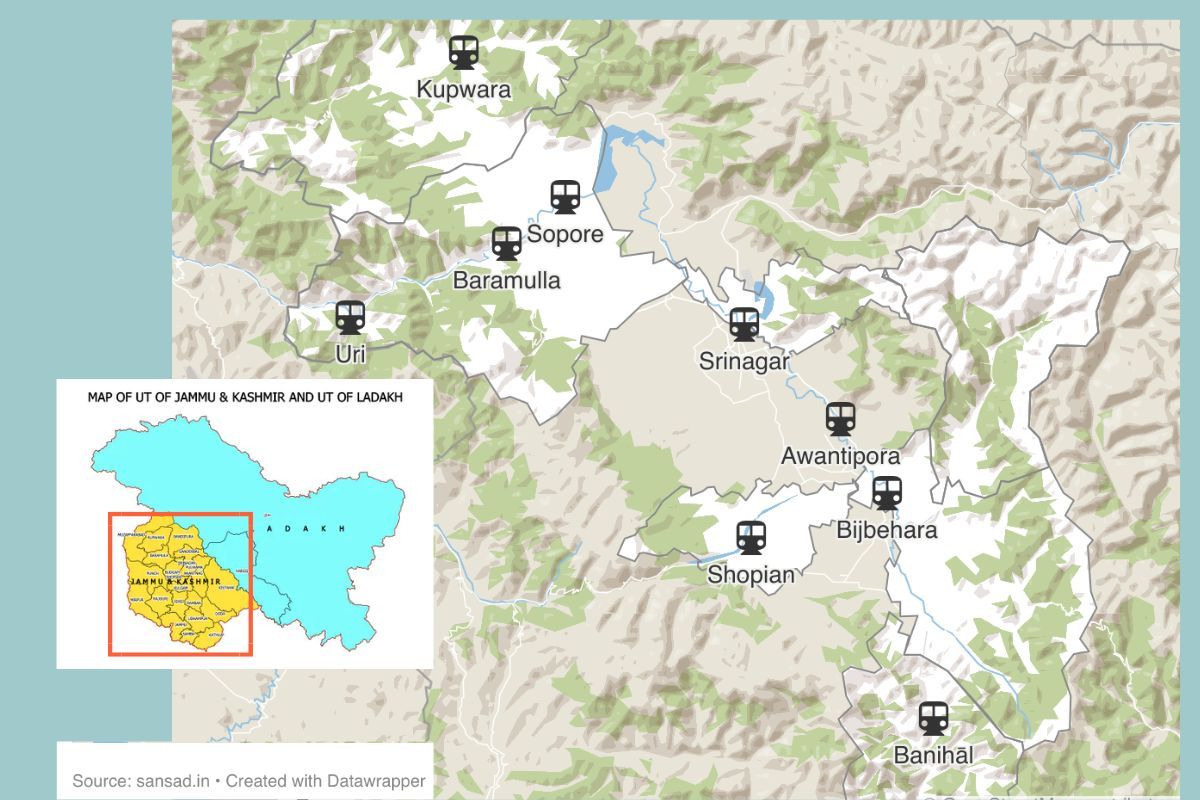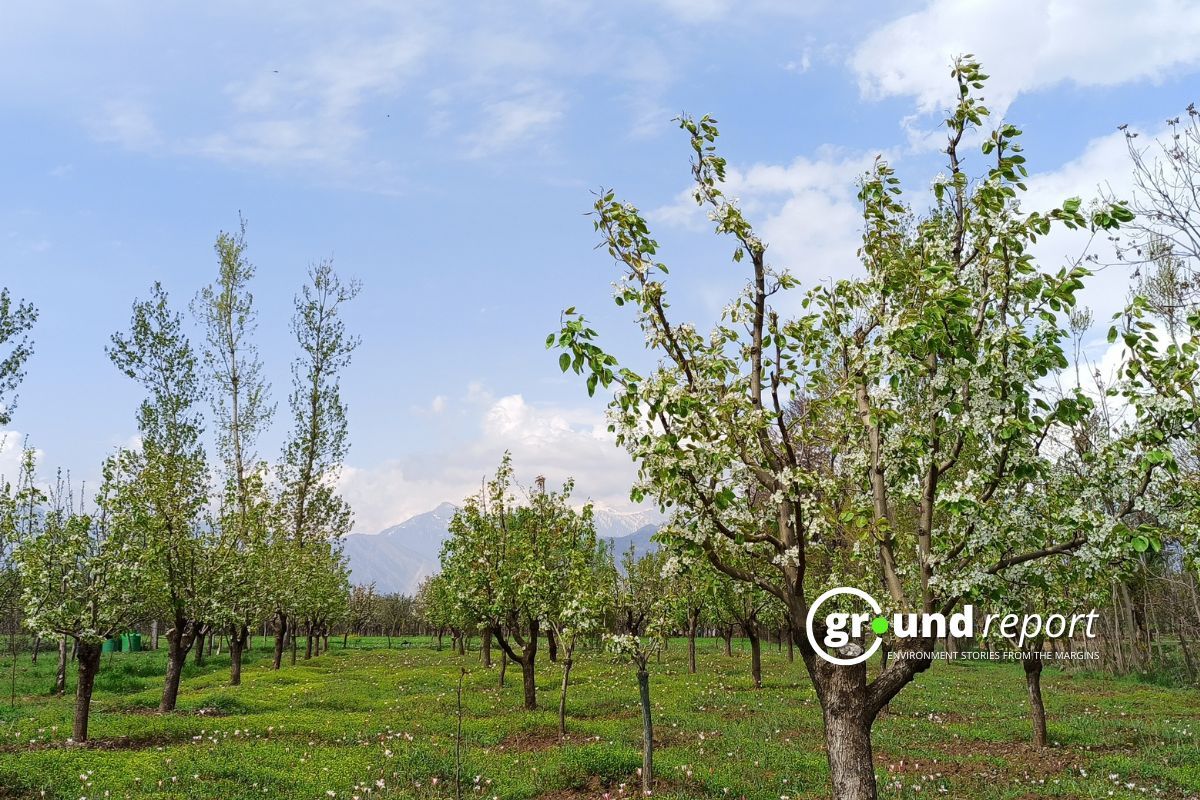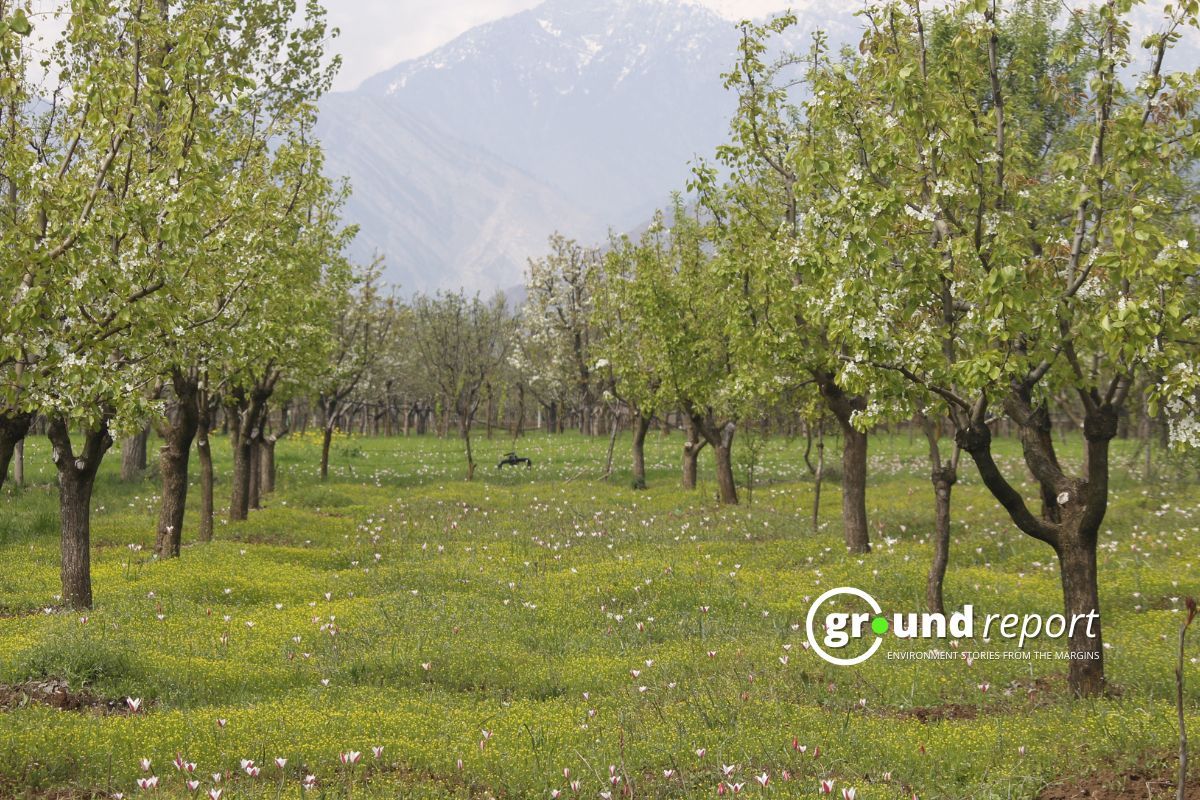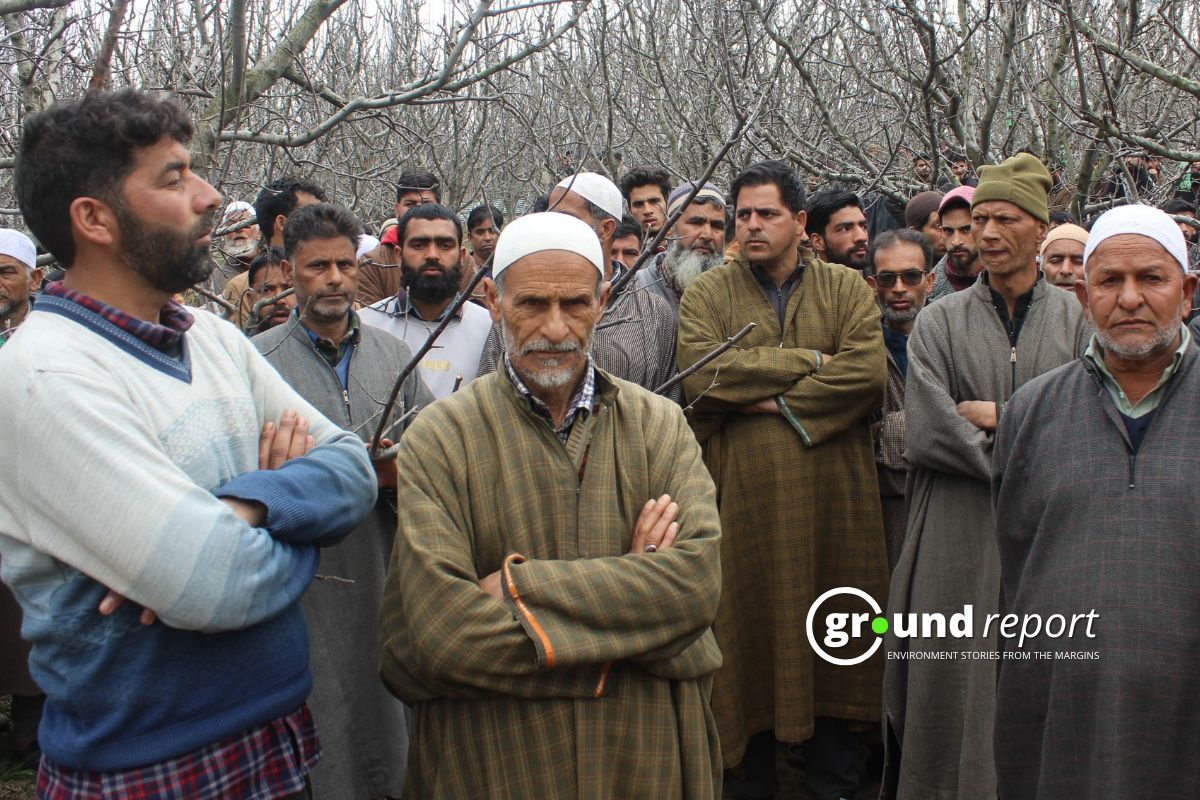“We will never surrender our land for a train route we never asked for, even if it means sacrificing everything… even our lives”, expresses Sajad Ahmad Reshi, an apple orchard owner from South Kashmir’s Shopian district. He has been a part of the protest for two long months against the railway line expansion.
The Railways Ministry has approved the Final Location Survey for five railway lines, all within the Kashmir division, as reported by Railways Minister Ashwini Vaishnaw in a detailed response in the Lok Sabha. According to Vaishnaw’s reply, the Final Location Survey for these five lines has been sanctioned in Jammu and Kashmir. The lines include the doubling of the Baramulla-Banihal section (135.5 kilometers), the Baramulla-Uri section (50 kilometers), the Sopore-Kupwara section (33.7 kilometers), the Awantipora-Shopian section (27.6 kilometres), and the Anantnag-Bijbehara-Pahalgam section (77.5 kilometers).

“We’re witnessing the unjust usurpation of our land under the guise of development… there’s simply no need to sacrifice our centuries-old orchards, integral to both our economy and environment… rather than nurturing more trees, they’re transforming our orchards into desolate wastelands, further exacerbating Kashmir’s already fragile climate,” said Abdul Hamid, a resident of Shopian, while speaking to Ground Report.
Dr. Raja Muzaffar, an environmental activist, told Ground Report,
“Although constructing a train route from Srinagar to Jammu might bring benefits, extending it into interior areas like Shopian, Pahalgam, and Chandanwari doesn’t make much sense. These areas are particularly vulnerable and lie close to significant glaciers like Kolhai and Amaranth. The construction and operation of the railway will inevitably lead to increased temperatures and carbon emissions, posing a serious threat to the delicate ecology of the valley. This could result in air pollution and potentially cause irreparable harm to the environment.”
New Railway routes spark tension in Shopian village
The railway project will primarily affect apple orchards in the Shopian area, particularly in the villages of Reshipora Zainapora.
Approx 3.5 million farmers, representing 27 % of Kashmir’s population, have apple orchards. The Orchards in Shopian cover around 26,231 hectares of land in the valley. The planned train route through Reshipora Zainapora will cut through these orchard lands. They cultivate fruits, notably apples, contributing over 8 per cent to the region’s GDP through exports. Shopian, dubbed the “Apple Bowl of Kashmir,” finds itself in serious trouble as the land marked for acquisition is known for producing the best quality apples. In addition, many farmers have poured their livelihoods into nurturing these orchards, which represent their sole source of income.

“Nearly 152 Kanals of Fertile Orchard Land have been earmarked for the Railway Line’s construction. This isn’t government land; it’s our own. The entire village’s apple orchards are at stake,” said Abdul Gani, a resident of Reshipora, Shopian. However, officials claim that there is no official notification released for the exact land acquisition.
Farmers unhappy, unofficial Surveys in Village
While talking to Ground Report, Aijaz Khuroo, the current Tehsildar of the Shopian’s Reshipora Zainapora, clarified that no official notice has been issued to acquire land in the area He explained that the recent activities were part of a preliminary exercise, not a formal acquisition. The railway route planning is part of the USBRL project, but it’s still undecided which side of the land will be used for the railway’s construction or operation in Shopian.
“The government might choose the other side… but since no decision has been made, we cannot acquire any land,” Khuroo said.
Khuroo noted that some drone surveys were conducted in the village, and land was being marked unofficially, which might have contributed to the confusion. However, protests erupted as locals feared their land might be taken without proper notice, preventing the survey from being completed.
“At first, they told us it would be just 100 feet,” said Abdul Gani, an orchard owner. “We thought we could manage that. But when they started marking the land, it turned out to be more than three times that! How are we supposed to make a living when they take away so much of our land? We feel cornered. The government isn’t listening, and we don’t know where to turn.”
On the other hand locals questioned why officials are marking their lands and spending hours on them if no official notice has been issued. “Without clear answers from the government, it has become difficult for us to believe that this is just a routine exercise, especially when our livelihoods depend entirely on these orchards.” a local farmer said to Ground Report.
![In Shopian, amidst the ongoing protest , an orchard owner watches over his precious orchards, fearing they may soon be claimed for the train route. [Photo Credit: Irfan Ahmad]](https://www.groundreport.in/wp-content/uploads/2024/04/cYdyAzwMLolKuBwx15SL-1.jpg)
Villagers recall previous instances of land contributions for various development purposes, and they claim to have received nearly some compensation in return.
“We’ve already given a lot of our land to the Government—300 Kanals to the CRPF Battalion and Horticulture Department for Drug farm and the Degree college Zainapora,” expresses Sajad Ahmad, his tone laced with bitterness against unfair land acquisition.
On the other hand, Fida Mohammad Bhat, a former Tehsildar in Shopian’s Reshipora Zainapora now in Budgam, said,
“The land used for the college was originally state-owned, therefore state land didn’t compensate. The land allocated for the drug farm by the horticultural department was however reclaimed by the government, and the compensation given to the people was quite low, leading to a sense of betrayal among the affected residents,” he said.
Activists and Political Leaders say on the matter
Dr. Raja Muzzaffar, an Environmental activist, said to Ground Report that the region’s resources were being exploited. He highlighted the folly of importing European ideas without considering Kashmir’s unique circumstances,
“There is a need for a thorough analysis of Kashmir’s forests and environment before making decisions that could inflict irreparable harm on the delicate ecological balance of the region.”
According to the Agriculture Census 2015-16, the official size of small agricultural landholdings in J&K was 0.55 hectares, but unofficial sources suggest it’s even smaller—around 0.35 hectares, or approximately six kanals. The 2010-2011 Agriculture Census reported that, in the Kashmir Valley, the average landholding size is smaller across many districts. In south Kashmir’s Anantnag, Kulgam, Shopian, and Pulwama, the landholding sizes are 0.39, 0.39, 0.56, and 0.48 hectares respectively. In central Kashmir’s Srinagar and Ganderbal, it is 0.31 and 0.37 hectares, while in North Kashmir’s Budgam, Baramulla, Ganderbal, Bandipora, and Kupwara, it is 0.43, 0.51, 0.37, 0.48, and 0.51 hectares respectively.

“While the government promises monetary compensation to farmers, it’s imperative to recognize that money is finite and temporary. In the long term, the ecological balance of the region will be affected,” Dr. Raja Muzaffar told Ground Report.
Ravinder Raina, BJP President, assured farmers in a meeting with the farmers that
“The project is a part of the initiative to connect Kashmir to Kanyakumari, and would not proceed at the expense of farmers’ livelihoods and no land would be taken for the project without their consent … farmers are the backbone of the economy and that the government would not take land from the Reshipora Zainapora area without their agreement.”
In his address to farmers, he promised to arrange a meeting with Lt. Governor Manoj Sinha and Divisional Commissioner Bidhudi and ensure that farmers’ grievances are addressed. However, locals claimed that a month had passed since his assurance, and no meeting had taken place which fueled skepticism among the farmers.
Democratic Deficit in Decision-making
The land acquisition laws purportedly democratic, typically involve consultations with the Gram Panchayat and community members. However, in Kashmir, the lack of democratic processes is a significant concern, especially as there is currently no elected government. The absence of a functioning state government means that the administration of the region falls under the jurisdiction of the Lieutenant Governor. However, despite numerous protests over issues like land acquisition and railway construction, there has been no official statement from the Lieutenant Governor.
Former Chief Minister Mehbooba Mufti expressed concerns about the proposed railway line in Shopian, highlighting the potential impact on the region’s apple orchards. She stressed the importance of conducting an impact assessment for the project to understand its environmental consequences.
“In this case, the proposed railway line will necessitate the felling of apple orchards at Shopian. I request Lieutenant Governor Manoj Sinha to involve a panel of environmental experts before making such major decisions,” she said.
She warned against repeating the mistakes made in Uttarakhand, where extensive road construction led to the felling of thousands of trees, resulting in environmental instability.
“Kashmir is more fragile than that, and this type of railway line should not be laid with eyes shut. There should be an assessment of its impact on our environment and orchards, and we should not face losses.”
Keep Reading
Indian agriculture household earns just Rs. 10,218 in a month: Govt
Post-harvest losses still high, reveals data shared in Lok Sabha
Khadi Haat village’s power-free wastewater treatment solution and more
Support us to keep independent environmental journalism alive in India.
Follow Ground Report on X, Instagram and Facebook for environmental and underreported stories from the margins. Give us feedback on our email id greport2018@gmail.com.
Don’t forget to Subscribe to our weekly newsletter, Join our community on WhatsApp, and Follow our YouTube Channel for video stories.






